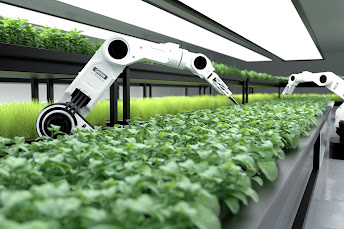Top Agricultural Innovations Driving Sustainable Farming
Introduction
Sustainable farming is crucial for the future of our planet. The Green Revolution has introduced numerous agricultural innovations that drive sustainable practices. These innovations help farmers produce more food with fewer resources, reducing the environmental impact. Let's explore the top agricultural innovations that are transforming sustainable farming.
Precision Agriculture
Enhanced Efficiency and Reduced Waste
Precision agriculture uses technology to optimize field-level management. By utilizing GPS, IoT, and data analytics, farmers can monitor and manage crops with great accuracy. This approach reduces waste, conserves resources, and enhances overall efficiency.
Smart Irrigation Systems
Water scarcity is a significant challenge in agriculture. Smart irrigation systems, such as drip irrigation and automated sprinklers, deliver water directly to the roots. These systems reduce water consumption and prevent overwatering, promoting sustainable water use.
Biotechnology in Agriculture
Genetically Modified Crops
Genetically modified (GM) crops are engineered to be more resistant to pests, diseases, and environmental conditions. This innovation reduces the need for chemical pesticides and increases crop yields. GM crops are crucial for sustainable agriculture as they require fewer resources to thrive.
Biofertilizers and Biopesticides
Chemical fertilizers and pesticides can harm the environment. Biofertilizers and biopesticides offer a sustainable alternative. They use natural organisms to promote plant growth and protect against pests. These biological solutions improve soil health and reduce chemical dependency.
Renewable Energy in Farming
Solar-Powered Farms
Solar energy is a clean and renewable resource. Farmers are increasingly adopting solar panels to power their operations. Solar-powered farms reduce reliance on fossil fuels and lower greenhouse gas emissions. This innovation contributes to a more sustainable agricultural system.
Wind Energy Utilization
Wind energy is another renewable source gaining traction in agriculture. Wind turbines on farms generate electricity, reducing energy costs and environmental impact. Utilizing wind energy supports sustainable farming by harnessing natural resources.
Sustainable Farming Practices
Crop Rotation and Polyculture
Crop rotation and polyculture involve growing different crops in the same area in sequenced seasons. These practices improve soil fertility and reduce pest outbreaks. By mimicking natural ecosystems, they promote biodiversity and sustainable land use.
Organic Farming
Organic farming avoids synthetic chemicals, focusing on natural inputs and processes. This method enhances soil health, reduces pollution, and supports biodiversity. Organic farming is a cornerstone of sustainable agriculture, providing healthy food without compromising the environment.
Conclusion
The Green Revolution has brought forth remarkable agricultural innovations driving sustainable farming. From precision agriculture to renewable energy, these innovations ensure a productive and environmentally friendly agricultural system. Embracing these practices is essential for a sustainable future, benefiting both farmers and the planet.



.jpg)
Comments
Post a Comment